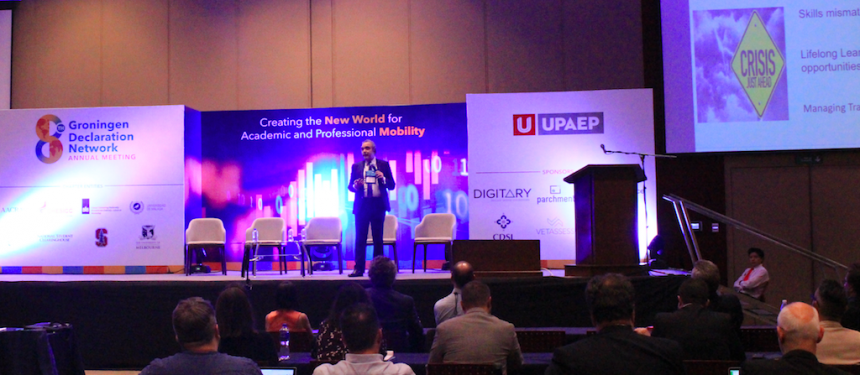The benefits of Blockchain vs digital signing technology as the tool underpinning the security of digital academic records was one of the conversations which kept experts engaged during the recent Groningen Declaration Network conference in Mexico.
News and business analysis for Professionals in International Education
Have some pie!
Momentum builds around secure, portable credentials
 Borhene Chakroun of Unesco spoke about lifelong learning and the need to attest to skills in the future workplace. Photo: The PIE News
Borhene Chakroun of Unesco spoke about lifelong learning and the need to attest to skills in the future workplace. Photo: The PIE News A greater global cohesion around the imperative of secure academic credentials and robust verification frameworks was achieved this year at the three-day event, its eighth iteration, ensuring that global qualification integrity now has its own voice and agenda.
“It’s the only international forum that’s joining all the dots across the globe”
With Unesco and many major government agencies attending the event – alongside commercial companies offering an array of credentialing and verification services – the conference also profiled many national and regional initiatives furthering secure portability and accessibility of data.
Erasmus without Paper was one such initiative, a European initiative to connect over 5000 HEIs and digitise all steps in the Erasmus+ mobility scheme; DAAD in Germany shared its own horizon-scanning on European projects (also including Europass); and Chinese & Canadian organisations shared details on respective national data exchange networks.
A global initiative called the PESC Geocode was also showcased among a series of “lightning talks”: it aims to be a globally implemented code system for institutions all around the world, a “fundamental building block in the data mobility ecosystem”, using a similar system to unique codes and numbers used in telephony.
Herman de Leeuw, executive director at GDN – a Dutch civil servant who was a pioneering force in establishing it – told The PIE News, “We were so happy to involve the Commonwealth of Learning, Unesco, the German Ministry of Education [this year].”
He stated, “We are clearly now bringing together a powerful coalition of international bodies and national governments and they all see the GDN as one of the uniting factors that are going to play a role in the future.”
Chris Jackson, CEO of Paradigm, a US-based credentials company, told The PIE News that there was an increasing realisation in his home market that international students and their needs had to be considered when delivering secure credentials.
“While the transcript is “king” in the United States, it is the diploma elsewhere in the world that is used as ‘proof of education’,” he explained.
“Historically, international students have not had access to digital diplomas, and if they wanted another paper diploma it could cost them anywhere from $25 to $200, significantly more than a transcript.”
Jackson said the momentum to modernise had picked up “quite tremendously”.
“As more international students have come to the US for their education, higher ed. has had to recognise that their previous policies may not be helping the students they are trying to attract,” he acknowledged.
“This is where digital diplomas have started to become popular since they are secure and portable, something that is very useful to the mobile, international student.”
Many companies in the field used the event to hear from peers in the industry about evolving demands from university admissions officers and government agendas to digitise and improve the sharing of secure academic records.
Antonio Pinedo, CEO of Signe which delivers the eTitulo product, commented, “The GDN conference is a useful international initiative, where I can have an overview on how different countries have worked to implement secure and transparent solutions.”
He added, “This has allowed me, as a provider of academic accreditation solutions, to visualise the needs and the evolution of the current needs of the market.”
Consensus clearly exists for international transparency and ease of sharing data but the likelihood of one global solution is still some way off. But the backing of Unesco, with its director of policies and lifelong learning systems speaking at the event, is a big affirmation of the GDN agenda.
Jayne Rowley, chief executive at HECSU in the UK which runs the Higher Education Degree Datacheck service, said GDN was important for its ability to foster global conversations about accessibility for all, including those from developing countries (and refugee access to education was part of the program).
“We are clearly now bringing together a powerful coalition of international bodies”
“It’s the only international forum that’s joining all the dots across the globe,” she said.
“It cares about students coming from developing countries as much as from developed international education economies. And it’s a passionate and committed group who will push this [agenda] forward.”
There was also an annual signing ceremony for organisations signing up to the GDN ideals at the event: signatories this year included Linneuniversitetet in Sweden (which has become a digital-only institution), DAAD in Germany, UAC in Australia (the university admissions system) and The PIE News.
Still looking? Find by category:


